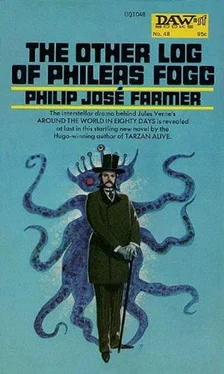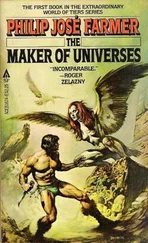Philip Farmer - The Other Log of Phileas Fogg
Здесь есть возможность читать онлайн «Philip Farmer - The Other Log of Phileas Fogg» весь текст электронной книги совершенно бесплатно (целиком полную версию без сокращений). В некоторых случаях можно слушать аудио, скачать через торрент в формате fb2 и присутствует краткое содержание. Жанр: Фантастика и фэнтези, на английском языке. Описание произведения, (предисловие) а так же отзывы посетителей доступны на портале библиотеки ЛибКат.
- Название:The Other Log of Phileas Fogg
- Автор:
- Жанр:
- Год:неизвестен
- ISBN:нет данных
- Рейтинг книги:3 / 5. Голосов: 1
-
Избранное:Добавить в избранное
- Отзывы:
-
Ваша оценка:
- 60
- 1
- 2
- 3
- 4
- 5
The Other Log of Phileas Fogg: краткое содержание, описание и аннотация
Предлагаем к чтению аннотацию, описание, краткое содержание или предисловие (зависит от того, что написал сам автор книги «The Other Log of Phileas Fogg»). Если вы не нашли необходимую информацию о книге — напишите в комментариях, мы постараемся отыскать её.
The Other Log of Phileas Fogg — читать онлайн бесплатно полную книгу (весь текст) целиком
Ниже представлен текст книги, разбитый по страницам. Система сохранения места последней прочитанной страницы, позволяет с удобством читать онлайн бесплатно книгу «The Other Log of Phileas Fogg», без необходимости каждый раз заново искать на чём Вы остановились. Поставьте закладку, и сможете в любой момент перейти на страницу, на которой закончили чтение.
Интервал:
Закладка:
At that moment, both Fogg and Aouda heard Passepartout’s cry.
Fogg ran out into the hall with a revolver in his hand. A few seconds later, Aouda came out of her room. She was holding a Colt six-shooter.
Fogg gestured for her to go to the other end of the hall so she could command the approach up the servants’ staircase. He hurried to the landing off the big central staircase. As he did so, he heard bootsteps clattering on the stairs. He got to the landing just in time. Three men were running up the second-story stairs, and all were armed with weapons which he instantly recognized as air pistols. He also recognized two of the men. One was a neighbor, the dissolute wenching young baronet, Sir Hector Osbaldistone. The other was Nemo. He had torn off the eye-mask which half-blinded him and the putty nose and false moustache.
Fogg’s shot and Nemo’s went off almost at the same time and both missed. The three men retreated down the stairs.
A shot sounded behind him. He whirled and saw smoke curling from Aouda’s pistol, and then he saw Aouda stagger back until she hit the wall. She slid down, dropping the pistol and clutching her right shoulder. Blood welled out from between the fingers of her left hand.
Fogg, crying, “Aouda, Aouda,” ran down the hall to her. She was pale, and her eyes looked strange, but she was able to murmur, “The bullet only creased me.”
He removed her hand and saw that it had done more than just burn the skin or break it. It had skimmed the upper part of her right breast but had gone into her flesh just below the collarbone. It seemed to have emerged without striking the shoulder bone, though he could not be sure. She was bleeding from both wounds profusely and would soon be in deeper shock, or even dead, if the bleeding were not stopped.
But if he attended to her, the staircase would be left open to the enemy.
She could not continue to man her post here, and he could not defend both positions. There was only one thing to do.
He lifted her and carried her down the hall and into his bedroom. Blood dripped from her and left a trail. Again, that could not be helped.
In the bedroom, he placed her on his bed and then locked the door. From the medicine chest in the bathroom he got dressings and bandages, which he applied in a feverish haste. For once, he was not serene.
Aouda stared at him and muttered something. He said, “Shh, dear!” and put a finger lightly over her lips. A few minutes later, he completed the bandaging. Some of her color seemed to be returning, though he was not sure that his hopes were not supplying it for his eyes. He started to move a heavy bureau toward the door when he heard a door slam down the hall. They were now on this floor and, though they had the trail of blood to follow, were searching the other rooms anyway.
Presently, the knob turned on his door. He fired his revolver at a point just above the knob. If he hit anybody he could not hear anything to indicate so.
A moment later Nemo’s voice came to him. “We have you, Fogg. There’s a man out in the garden with an air rifle. He’ll drop you without fail if you so much as even show yourself at the windows. He’s the best shot in the East and perhaps in the West, too. We have the Frenchman and his distorter, and we can shoot our way in at any time.”
“Not without loss,” Fogg said calmly.
Nemo said something Fogg could not hear distinctly. Footsteps sounded as a man walked heavily away. Fogg shoved the bureau toward the door but decided not to bring it against the door. He would leave it several feet away and would place burning oil lamps on its top and at its bottom. If they did try to storm him, he would shoot both lamps. The paraffin oil (called kerosene by the Americans) would form an impenetrable barrier, and some of it might even splash on the invaders and set them afire. The dangerous disadvantage of this was that he and Aouda would have to get out of the room to escape being burned alive. Aouda might be incapable of getting out by herself, in which case he would have to lower her on the rope made out of bedsheets. This would make both of them somewhat easy targets for the rifleman in the garden.
That would have to be taken care of when it occurred. Fogg would throw out his last lamp and hope that its burning would illuminate the garden enough for him to see the rifleman. Also, the fire might be seen by the neighbors behind him, and an alarm would, he hoped, force the Capelleans to run. He could, of course, shoot out the window now and try to attract the attention of the neighborhood. But he had heard the fire wagons and the explosion and had comprehended that the explosion was a trick to draw his neighbors away for the time being.
He set the third lamp, as yet unlit, by the window, peered between the curtains, and then turned away. The sky was overcast; the garden was in an impenetrable darkness. If only there were snow there, he might be able to see better what the garden held.
After turning off the jet light, he got some brandy for Aouda and lifted her head so she could drink. Some blood had spread beyond her bandages, but the flow seemed to have stopped.
“Did you hear all that?” he whispered.
“Yes,” she said.
“He hasn’t much time to do whatever he is going to do,” he said. “And the neighbors will surely be back soon. At least, some of the servants will have to return; they won’t want to take the chance of displeasing their masters by staying away too long. And our chief is sure to reply to my telegram. Perhaps even now the house is under surveillance by our people.”
“I trust you to see us all through,” Aouda said weakly.
“One way or the other,” Mr. Fogg said.
“Did I hear you call me Aouda dear?”
“You were not mistaken,” he said.
“Would that mean…?”
“It would.”
She smiled slightly, and her eyes looked brighter.
“I have been waiting to hear you say that,” she said. “And then…”
“And then…?”
“And then kiss me.”
Fogg stooped over and kissed her lightly. Straightening, he said, “I dare not press my ardor, Aouda, since you are in no condition to receive anything but a tender nursing. But would you marry me?”
“If we had a minister, immediately,” she said.
Passepartout, meanwhile, watched Nemo and Vandeleur as they watched the scene on the street. According to their comments, which were frequently asterisked by oaths, the plight of the colonel had attracted a number of people returning from the excitement. From Vandeleur’s exclamations, the first to reach the colonel was a street boy, a ragged and dirty urchin. “He’s not helping him!” Vandeleur said. “He’s robbing him!”
“What?” Nemo said, and he opened the curtains a trifle more.
“He’s taking the distorter!” he said. “He’s running away with his wallet and the watch!”
Vandeleur turned to his chief for orders and saw then that he was in no condition to give them. He had been seized with a fit of shaking.
Vandeleur said, “By God, you aren’t fit to command us!” He started to open the door, but Nemo, by a great effort of will, overcame the shaking. He bounded forward and struck Vandeleur on the back of his neck with the barrel of the air pistol. Vandeleur crumpled. Nemo shut the door.
Though his body had quit shuddering, Nemo’s head still oscillated. And when he spat out his recriminations at Vandeleur, he seemed to Passepartout to resemble a giant snake even more.
“Did you think you could really catch that guttersnipe? What did you think would happen when you dashed out of a house supposedly uninhabited? And so you think that I am not fit to command?”
Vandeleur did not answer. Nemo kicked him heavily in the ribs and snarled, “Get up!”
Читать дальшеИнтервал:
Закладка:
Похожие книги на «The Other Log of Phileas Fogg»
Представляем Вашему вниманию похожие книги на «The Other Log of Phileas Fogg» списком для выбора. Мы отобрали схожую по названию и смыслу литературу в надежде предоставить читателям больше вариантов отыскать новые, интересные, ещё непрочитанные произведения.
Обсуждение, отзывы о книге «The Other Log of Phileas Fogg» и просто собственные мнения читателей. Оставьте ваши комментарии, напишите, что Вы думаете о произведении, его смысле или главных героях. Укажите что конкретно понравилось, а что нет, и почему Вы так считаете.












